In today’s fast-paced and ever-evolving global landscape, businesses and organizations face a myriad of risks that can impact their operations, reputation, and bottom line. From financial uncertainties and regulatory changes to cyber threats and environmental challenges, the need for skilled risk management professionals has never been greater. The Level 6 International Diploma in Risk Management is designed to equip individuals with the knowledge, skills, and expertise needed to effectively identify, assess, and mitigate risks in diverse organizational settings.
Risk management involves the systematic process of understanding, evaluating, and addressing risks to maximize the potential for success and minimize the likelihood of adverse outcomes. It is a critical function that spans across various sectors, including finance, healthcare, manufacturing, and technology. Effective risk management helps organizations anticipate potential threats, develop strategies to manage them, and ensure business continuity.
In an increasingly complex and uncertain world, the ability to manage risks effectively is a valuable skill that can significantly enhance an organization’s resilience and success. The Level 6 International Diploma in Risk Management offers a comprehensive and practical approach to developing these skills, preparing professionals to navigate the challenges and opportunities of today’s risk landscape. Whether you are looking to advance your career or enter the field of risk management, this diploma provides the knowledge and expertise needed to make a meaningful impact.
Program Highlights
Mandatory Units
- Risk Management: An introduction and Overview
- Corporate Culture and Risk Management
- Risk Identification Methodologies
- Incidents Prevention and Risk Control
- Risk Assessment and Legal Compliance
- Responsible Governance and Performance Measurement
Educational Background
- Minimum Qualification: Candidates should have at least a Level 4 qualification or equivalent in a related field. This could be a diploma or an equivalent level of education in areas such as business, finance, or management.
- Relevant Experience: In some cases, relevant work experience may be considered in lieu of formal qualifications. A background in business, management, or a related field will be advantageous.
Professional Experience
- Work Experience: While not always mandatory, having a minimum of 1-2 years of professional experience in a business or management role can be beneficial. Experience in risk management, finance, or operations is particularly relevant.
- Role Relevance: Candidates should ideally have experience or be working in roles that involve decision-making, strategic planning, or managing organizational risks.
Language Proficiency
- English Language Skills: Proficiency in English is essential, as the course materials and assessments are conducted in English. Non-native English speakers may be required to provide evidence of their language proficiency through tests like IELTS, TOEFL, or equivalent.
Technical Skills
- Basic IT Skills: Competence in using standard office software (e.g., Microsoft Word, Excel, and PowerPoint) is necessary for completing coursework and assignments.
Motivation and Commitment
- Commitment to Study: Candidates should demonstrate a strong commitment to completing the course, which involves attending classes, engaging with course materials, and meeting deadlines for assignments and assessments.
Application Process
- Application Form: Candidates are typically required to complete an application form, providing personal details, educational background, and professional experience.
- Supporting Documents: Submission of supporting documents, such as academic transcripts, a CV, and a personal statement or cover letter, may be required to demonstrate eligibility and motivation.
- Interview or Assessment (if applicable): Some institutions may require an interview or assessment to evaluate the candidate’s suitability for the course.
Risk Management: An Introduction and Overview
- Understand Risk Management Concepts: Demonstrate a comprehensive understanding of fundamental concepts in risk management, including definitions, objectives, and the importance of risk management in organizational success.
- Identify Risk Management Frameworks: Recognize and describe various risk management frameworks and standards, such as ISO 31000, and explain their application in different organizational contexts.
- Explain Risk Management Process: Outline the key steps in the risk management process, from risk identification to risk monitoring and review.
Corporate Culture and Risk Management
- Analyze Corporate Culture Impact: Assess how corporate culture influences risk management practices and decision-making within organizations.
- Develop Risk Culture Strategies: Identify strategies to cultivate a risk-aware culture that supports effective risk management and promotes proactive risk handling.
- Evaluate Leadership Role: Evaluate the role of leadership in shaping and reinforcing corporate culture related to risk management.
Risk Identification Methodologies
- Apply Risk Identification Techniques: Apply various risk identification techniques, such as brainstorming, checklists, and SWOT analysis, to identify potential risks in organizational settings.
- Utilize Risk Assessment Tools: Utilize risk assessment tools and methodologies to systematically identify and document risks.
- Analyze Risk Sources: Analyze different sources of risk, including internal and external factors, and their potential impact on the organization.
Incidents Prevention and Risk Control
- Design Preventive Measures: Develop and implement strategies and measures to prevent incidents and mitigate risks, including risk avoidance, risk reduction, and risk transfer techniques.
- Implement Risk Controls: Demonstrate the ability to implement and manage risk control measures effectively, including safety protocols and operational controls.
- Monitor and Review Control Effectiveness: Monitor and review the effectiveness of risk control measures and adjust them as necessary to address emerging risks and changes in the organizational environment.
Risk Assessment and Legal Compliance
- Conduct Risk Assessments: Conduct thorough risk assessments to evaluate the likelihood and impact of identified risks on the organization.
- Ensure Legal Compliance: Understand and apply legal and regulatory requirements related to risk management, ensuring compliance with relevant laws and standards.
- Document and Report Risks: Develop comprehensive risk assessment reports that document findings, recommendations, and compliance status.
Responsible Governance and Performance Measurement
- Understand Governance Principles: Explain the principles of responsible governance and their significance in effective risk management and organizational performance.
- Implement Governance Practices: Implement governance practices that ensure transparency, accountability, and ethical behavior in risk management processes.
- Measure and Evaluate Performance: Develop and use performance measurement tools to evaluate the effectiveness of risk management practices and governance structures, and make data-driven improvements.
The Level 6 International Diploma in Risk Management is designed for professionals who aspire to advance their careers in the field of risk management and governance. This course is ideal for individuals currently working in or aiming for roles such as risk managers, compliance officers, financial analysts, or project managers, who need to deepen their understanding of risk management practices and frameworks. It is also suitable for those seeking to transition into risk management from related fields like business management, finance, or operations. With a focus on strategic and operational risk management, this diploma provides valuable insights for professionals looking to enhance their ability to identify, assess, and mitigate risks, ensuring they can contribute effectively to their organization’s resilience and long-term success.







